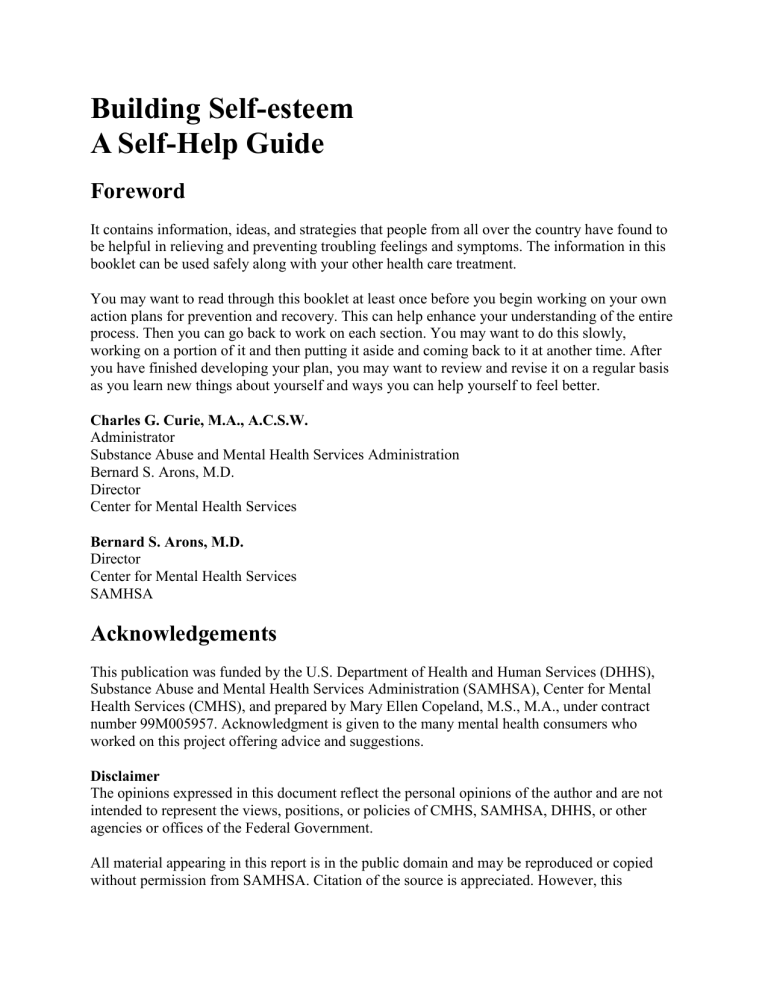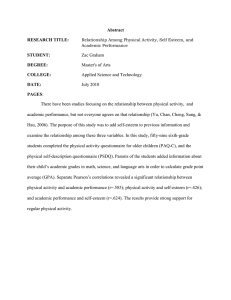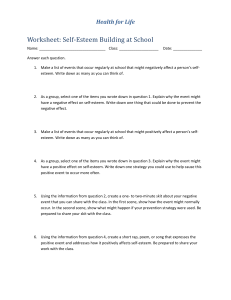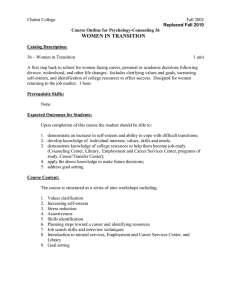Building Self-Esteem: A Self-Help Guide
advertisement

Building Self-esteem A Self-Help Guide Foreword It contains information, ideas, and strategies that people from all over the country have found to be helpful in relieving and preventing troubling feelings and symptoms. The information in this booklet can be used safely along with your other health care treatment. You may want to read through this booklet at least once before you begin working on your own action plans for prevention and recovery. This can help enhance your understanding of the entire process. Then you can go back to work on each section. You may want to do this slowly, working on a portion of it and then putting it aside and coming back to it at another time. After you have finished developing your plan, you may want to review and revise it on a regular basis as you learn new things about yourself and ways you can help yourself to feel better. Charles G. Curie, M.A., A.C.S.W. Administrator Substance Abuse and Mental Health Services Administration Bernard S. Arons, M.D. Director Center for Mental Health Services Bernard S. Arons, M.D. Director Center for Mental Health Services SAMHSA Acknowledgements This publication was funded by the U.S. Department of Health and Human Services (DHHS), Substance Abuse and Mental Health Services Administration (SAMHSA), Center for Mental Health Services (CMHS), and prepared by Mary Ellen Copeland, M.S., M.A., under contract number 99M005957. Acknowledgment is given to the many mental health consumers who worked on this project offering advice and suggestions. Disclaimer The opinions expressed in this document reflect the personal opinions of the author and are not intended to represent the views, positions, or policies of CMHS, SAMHSA, DHHS, or other agencies or offices of the Federal Government. All material appearing in this report is in the public domain and may be reproduced or copied without permission from SAMHSA. Citation of the source is appreciated. However, this publication may not be reproduced or distributed for a fee without the specific, written authorization of the Office of Communications, SAMHSA, DHHS. For additional copies of this document, please call SAMHSA's National Mental Health Information Center at 1-800-789-2647. Originating Office Center for Mental Health Services Substance Abuse and Mental Health Services Administration 5600 Fishers Lane, Room 15-99 Rockville, MD 20857 SMA-3715 Table of Contents Foreword Introduction Self-esteem, Depression and Other Illnesses Things You Can Do Right Away—Every Day—to Raise Your Self-esteem Changing Negative Thoughts About Yourself to Positive Ones Activities That Will Help You Feel Good About Yourself In Conclusion Further Resources SMA-3715 Introduction Most people feel bad about themselves from time to time. Feelings of low self-esteem may be triggered by being treated poorly by someone else recently or in the past, or by a person’s own judgments of him or herself. This is normal. However, low self-esteem is a constant companion for too many people, especially those who experience depression, anxiety, phobias, psychosis, delusional thinking, or who have an illness or a disability. If you are one of these people, you may go through life feeling bad about yourself needlessly. Low self-esteem keeps you from enjoying life, doing the things you want to do, and working toward personal goals. You have a right to feel good about yourself. However, it can be very difficult to feel good about yourself when you are under the stress of having symptoms that are hard to manage, when you are dealing with a disability, when you are having a difficult time, or when others are treating you badly. At these times, it is easy to be drawn into a downward spiral of lower and lower selfesteem. For instance, you may begin feeling bad about yourself when someone insults you, you are under a lot of pressure at work, or you are having a difficult time getting along with someone in your family. Then you begin to give yourself negative self-talk, like "I'm no good." That may make you feel so bad about yourself that you do something to hurt yourself or someone else, such as getting drunk or yelling at your children. By using the ideas and activities in this booklet, you can avoid doing things that make you feel even worse and do those things that will make you feel better about yourself. This booklet will give you ideas on things you can do to feel better about yourself–to raise your self-esteem. The ideas have come from people like yourself, people who realize they have low self-esteem and are working to improve it. As you begin to use the methods in this booklet and other methods that you may think of to improve your self-esteem, you may notice that you have some feelings of resistance to positive feelings about yourself. This is normal. Don't let these feelings stop you from feeling good about yourself. They will diminish as you feel better and better about yourself. To help relieve these feelings, let your friends know what you are going through. Have a good cry if you can. Do things to relax, such as meditating or taking a nice warm bath. As you read this booklet and work on the exercises, keep the following statement in mind — "I am a very special, unique, and valuable person. I deserve to feel good about myself." Self-esteem, Depression and Other Illnesses Before you begin to consider strategies and activities to help raise your self-esteem, it is important to remember that low self-esteem may be due to depression. Low self-esteem is a symptom of depression. To make things even more complicated, the depression may be a symptom of some other illness. Have you felt sad consistently for several weeks but don't know why you are feeling so sad, i.e. nothing terribly bad has happened, or maybe something bad has happened but you haven't been able to get rid of the feelings of sadness? Is this accompanied by other changes, like wanting to eat all the time or having no appetite, wanting to sleep all the time or waking up very early and not being able to get back to sleep? If you answered yes to either question, there are two things you need to do — see your doctor for a physical examination to determine the cause of your depression and to discuss treatment choices do some things that will help you to feel better right away like eating well, getting plenty of exercise and outdoor light, spending time with good friends, and doing fun things like going to a movie, painting a picture, playing a musical instrument, or reading a good book. Things You Can Do Right Away—Every Day—to Raise Your Self-esteem Pay attention to your own needs and wants. Listen to what your body, your mind, and your heart are telling you. For instance, if your body is telling you that you have been sitting down too long, stand up and stretch. If your heart is longing to spend more time with a special friend, do it. If your mind is telling you to clean up your basement, listen to your favorite music, or stop thinking bad thoughts about yourself, take those thoughts seriously. Take very good care of yourself. As you were growing up you may not have learned how to take good care of yourself. In fact, much of your attention may have been on taking care of others, on just getting by, or on "behaving well." Begin today to take good care of yourself. Treat yourself as a wonderful parent would treat a small child or as one very best friend might treat another. If you work at taking good care of yourself, you will find that you feel better about yourself. Here are some ways to take good care of yourself— Eat healthy foods and avoid junk foods (foods containing a lot of sugar, salt, or fat). A healthy daily diet is usually: five or six servings of vegetables and fruit six servings of whole grain foods like bread, pasta, cereal, and rice two servings of protein foods like beef, chicken, fish, cheese, cottage cheese, or yogurt Exercise. Moving your body helps you to feel better and improves your self-esteem. Arrange a time every day or as often as possible when you can get some exercise, preferably outdoors. You can do many different things. Taking a walk is the most common. You could run, ride a bicycle, play a sport, climb up and down stairs several times, put on a tape, or play the radio and dance to the music–anything that feels good to you. If you have a health problem that may restrict your ability to exercise, check with your doctor before beginning or changing your exercise habits. o o o Do personal hygiene tasks that make you feel better about yourself–things like taking a regular shower or bath, washing and styling your hair, trimming your nails, brushing and flossing your teeth. Have a physical examination every year to make sure you are in good health. Plan fun activities for yourself. Learn new things every day. Take time to do things you enjoy. You may be so busy, or feel so badly about yourself, that you spend little or no time doing things you enjoy--things like playing a musical instrument, doing a craft project, flying a kite, or going fishing. Make a list of things you enjoy doing. Then do something from that list every day. Add to the list anything new that you discover you enjoy doing. Get something done that you have been putting off. Clean out that drawer. Wash that window. Write that letter. Pay that bill. Do things that make use of your own special talents and abilities. For instance, if you are good with your hands, then make things for yourself, family, and friends. If you like animals, consider having a pet or at least playing with friends' pets. Dress in clothes that make you feel good about yourself. If you have little money to spend on new clothes, check out thrift stores in your area. Give yourself rewards—you are a great person. Listen to a CD or tape. Spend time with people who make you feel good about yoursel—people who treat you well. Avoid people who treat you badly. Make your living space a place that honors the person you are. Whether you live in a single room, a small apartment, or a large home, make that space comfortable and attractive for you. If you share your living space with others, have some space that is just for you--a place where you can keep your things and know that they will not be disturbed and that you can decorate any way you choose. Display items that you find attractive or that remind you of your achievements or of special times or people in your life. If cost is a factor, use your creativity to think of inexpensive or free ways that you can add to the comfort and enjoyment of your space. Make your meals a special time. Turn off the television, radio, and stereo. Set the table, even if you are eating alone. Light a candle or put some flowers or an attractive object in the center of the table. Arrange your food in an attractive way on your plate. If you eat with others, encourage discussion of pleasant topics. Avoid discussing difficult issues at meals. Take advantage of opportunities to learn something new or improve your skills. Take a class or go to a seminar. Many adult education programs are free or very inexpensive. For those that are more costly, ask about a possible scholarship or fee reduction. Begin doing those things that you know will make you feel better about yourself— like going on a diet, beginning an exercise program or keeping your living space clean. Do something nice for another person. Smile at someone who looks sad. Say a few kind words to the check-out cashier. Help your spouse with an unpleasant chore. Take a meal to a friend who is sick. Send a card to an acquaintance. Volunteer for a worthy organization. Make it a point to treat yourself well every day. Before you go to bed each night, write about how you treated yourself well during the day. You may be doing some of these things now. There will be others you need to work on. You will find that you will continue to learn new and better ways to take care of yourself. As you incorporate these changes into your life, your self-esteem will continue to improve. Changing Negative Thoughts About Yourself to Positive Ones You may be giving yourself negative messages about yourself. Many people do. These are messages that you learned when you were young. You learned from many different sources including other children, your teachers, family members, caregivers, even from the media, and from prejudice and stigma in our society. Once you have learned them, you may have repeated these negative messages over and over to yourself, especially when you were not feeling well or when you were having a hard time. You may have come to believe them. You may have even worsened the problem by making up some negative messages or thoughts of your own. These negative thoughts or messages make you feel bad about yourself and lower your self-esteem. Some examples of common negative messages that people repeat over and over to themselves include: "I am a jerk," "I am a loser," "I never do anything right," "No one would ever like me," I am a klutz." Most people believe these messages, no matter how untrue or unreal they are. They come up immediately in the right circumstance, for instance if you get a wrong answer you think "I am so stupid." They may include words like should, ought, or must. The messages tend to imagine the worst in everything, especially you, and they are hard to turn off or unlearn. You may think these thoughts or give yourself these negative messages so often that you are hardly aware of them. Pay attention to them. Carry a small pad with you as you go about your daily routine for several days and jot down negative thoughts about yourself whenever you notice them. Some people say they notice more negative thinking when they are tired, sick, or dealing with a lot of stress. As you become aware of your negative thoughts, you may notice more and more of them. It helps to take a closer look at your negative thought patterns to check out whether or not they are true. You may want a close friend or counselor to help you with this. When you are in a good mood and when you have a positive attitude about yourself, ask yourself the following questions about each negative thought you have noticed: Is this message really true? Would a person say this to another person? If not, why am I saying it to myself? What do I get out of thinking this thought? If it makes me feel badly about myself, why not stop thinking it? You could also ask someone else—someone who likes you and who you trust—if you should believe this thought about yourself. Often, just looking at a thought or situation in a new light helps. The next step in this process is to develop positive statements you can say to yourself to replace these negative thoughts whenever you notice yourself thinking them. You can't think two thoughts at the same time. When you are thinking a positive thought about yourself, you can't be thinking a negative one. In developing these thoughts, use positive words like happy, peaceful, loving, enthusiastic, warm. Avoid using negative words such as worried, frightened, upset, tired, bored, not, never, can't. Don't make a statement like "I am not going to worry any more." Instead say "I focus on the positive" or whatever feels right to you. Substitute "it would be nice if" for "should." Always use the present tense, e.g., "I am healthy, I am well, I am happy, I have a good job," as if the condition already exists. Use I, me, or your own name. You can do this by folding a piece of paper in half the long way to make two columns. In one column write your negative thought and in the other column write a positive thought that contradicts the negative thought as shown on the next page. You can work on changing your negative thoughts to positive ones by — Replacing the negative thought with the positive one every time you realize you are thinking the negative thought. repeating your positive thought over and over to yourself, out loud whenever you get a chance and even sharing them with another person if possible. writing them over and over. making signs that say the positive thought, hanging them in places where you would see them often-like on your refrigerator door or on the mirror in your bathroom-and repeating the thought to yourself several times when you see it. Negative Thought Positive Thought I am not worth anything. I am a valuable person. I have never accomplished anything. I have accomplished many things. I always make mistakes. I do many things well. I am a jerk. I am a great person. I don't deserve a good life. I deserve to be happy and healthy. I am stupid. I am smart. It helps to reinforce the positive thought if you repeat if over and over to yourself when you are deeply relaxed, like when you are doing a deep-breathing or relaxation exercise, or when you are just falling asleep or waking up. Changing the negative thoughts you have about yourself to positive ones takes time and persistence. If you use the following techniques consistently for four to six weeks, you will notice that you don't think these negative thoughts about yourself as much. If they recur at some other time, you can repeat these activities. Don't give up. You deserve to think good thoughts about yourself. Activities That Will Help You Feel Good About Yourself Any of the following activities will help you feel better about yourself and reinforce your selfesteem over the long term. Read through them. Do those that seem most comfortable to you. You may want to do some of the other activities at another time. You may find it helpful to repeat some of these activities again and again. Make affirming lists Making lists, rereading them often, and rewriting them from time to time will help you to feel better about yourself. If you have a journal, you can write your lists there. If you don't, any piece of paper will do. Make a list of — at least five of your strengths, for example, persistence, courage, friendliness, creativity at least five things you admire about yourself, for example the way you have raised your children, your good relationship with your brother, or your spirituality the five greatest achievements in your life so far, like recovering from a serious illness, graduating from high school, or learning to use a computer at least 20 accomplishments-they can be as simple as learning to tie your shoes, to getting an advanced college degree 10 ways you can "treat" or reward yourself that don't include food and that don't cost anything, such as walking in woods, window-shopping, watching children playing on a playground, gazing at a baby's face or at a beautiful flower, or chatting with a friend 10 things you can do to make yourself laugh 10 things you could do to help someone else 10 things that you do that make you feel good about yourself Reinforcing a positive self image To do this exercise you will need a piece of paper, a pencil or pen, and a timer or clock. Any kind of paper will do, but if you have paper and pen you really like, that will be even better. Set a timer for 10 minutes or note the time on your watch or a clock. Write your name across the top of the paper. Then write everything positive and good you can think of about yourself. Include special attributes, talents, and achievements. You can use single words or sentences, whichever you prefer. You can write the same things over and over if you want to emphasize them. Don't worry about spelling or grammar. Your ideas don't have to be organized. Write down whatever comes to mind. You are the only one who will see this paper. Avoid making any negative statements or using any negative words—only positive ones. When the 10 minutes are up, read the paper over to yourself. You may feel sad when you read it over because it is a new, different, and positive way of thinking about yourself–a way that contradicts some of the negative thoughts you may have had about yourself. Those feelings will diminish as your reread this paper. Read the paper over again several times. Put it in a convenient place–your pocket, purse, wallet, or the table beside your bed. Read it over to yourself at least several times a day to keep reminding yourself of how great you are! Find a private space and read it aloud. If you can, read it to a good friend or family member who is supportive. Developing Positive Affirmations Affirmations are positive statements that you can make about yourself that make you feel better about yourself. They describe ways you would like to feel about yourself all the time. They may not, however, describe how you feel about yourself right now. The following examples of affirmations will help you in making your own list of affirmations — I feel good about myself I take good care of myself. I eat right, get plenty of exercise, do things I enjoy, get good health care, and attend to my personal hygiene needs I spend my time with people who are nice to me and make me feel good about myself I am a good person I deserve to be alive Many people like me Make a list of your own affirmations. Keep this list in a handy place, like your pocket or purse. You may want to make copies of your list so you can have them in several different places of easy access. Read the affirmations over and over to yourself—aloud whenever you can. Share them with others when you feel like it. Write them down from time to time. As you do this, the affirmations tend to gradually become true for you. You gradually come to feel better and better about yourself. Your personal "celebratory scrapbook" and place to honor yourself. Develop a scrapbook that celebrates you and the wonderful person you are. Include pictures of yourself at different ages, writings you enjoy, mementos of things you have done and places you have been, cards you have received, etc. Or set up a place in your home that celebrates "you." It could be on a bureau, shelf, or table. Decorate the space with objects that remind you of the special person you are. If you don't have a private space that you can leave set up, put the objects in a special bag, box, or your purse and set them up in the space whenever you do this work. Take them out and look at them whenever you need to bolster your self-esteem. Appreciation exercise. At the top of a sheet of paper write "I like _____ (your name) because:" Have friends, acquaintances, family members, etc., write an appreciative statement about you on it. When you read it, don't deny it OR don't argue with what has been written, just accept it! Read this paper over and over. Keep it in a place where you will see it often. Self-esteem calendar. Get a calendar with large blank spaces for each day. Schedule into each day some small thing you would enjoy doing, such as "go into a flower shop and smell the flowers," "call my sister," "draw a sketch of my cat," "buy a new CD," "tell my daughter I love her," "bake brownies," "lie in the sun for 20 minutes," "wear my favorite scent," etc. Now make a commitment to check your "enjoy life" calendar every day and do whatever you have scheduled for yourself. Mutual complimenting exercise. Get together for 10 minutes with a person you like and trust. Set a timer for five minutes or note the time on a watch or clock. One of you begins by complimenting the other person—saying everything positive about the other person—for the first five minutes. Then the other person does the same thing to that person for the next five minutes. Notice how you feel about yourself before and after this exercise. Repeat it often. Self-esteem resources. Go to your library. Look up books on self-esteem. Read one or several of them. Try some of the suggested activities. In Conclusion This booklet is just the beginning of the journey. As you work on building your self-esteem you will notice that you feel better more and more often, that you are enjoying your life more than you did before, and that you are doing more of the things you have always wanted to do. Further Resources Substance Abuse and Mental Health Services Administration (SAMHSA) Center for Mental Health Services Web site: www.samhsa.gov SAMHSA's National Mental Health Information Center P.O. Box 42557 Washington, D.C. 20015 1 (800) 789-2647 (voice) Web site: mentalhealth.samhsa.gov Consumer Organization and Networking Technical Assistance Center (CONTAC) P.O. Box 11000 Charleston, WV 25339 1 (888) 825-TECH (8324) (304) 346-9992 (fax) Web site: www.contac.org Depression and Bipolar Support Alliance (DBSA) (formerly the National Depressive and Manic-Depressive Association) 730 N. Franklin Street, Suite 501 Chicago, IL 60610-3526 (800) 826-3632 Web site: www.dbsalliance.org National Alliance for the Mentally Ill (NAMI) (Special Support Center) Colonial Place Three 2107 Wilson Boulevard, Suite 300 Arlington, VA 22201-3042 (703) 524-7600 Web site: www.nami.org National Empowerment Center 599 Canal Street, 5 East Lawrence, MA 01840 1-800-power2u (800)TDD-POWER (TDD) (978)681-6426 (fax) Web site: www.power2u.org National Mental Health Consumers’ Self-Help Clearinghouse 1211 Chestnut Street, Suite 1207 Philadelphia, PA 19107 1 (800) 553-4539 (voice) (215) 636-6312 (fax) e-mail: info@mhselfhelp.org Web site: www.mhselfhelp.org Resources listed in this document do not constitute an endorsement by CMHS/SAMHSA/HHS, nor are these resources exhaustive. Nothing is implied by an organization not being referenced.




